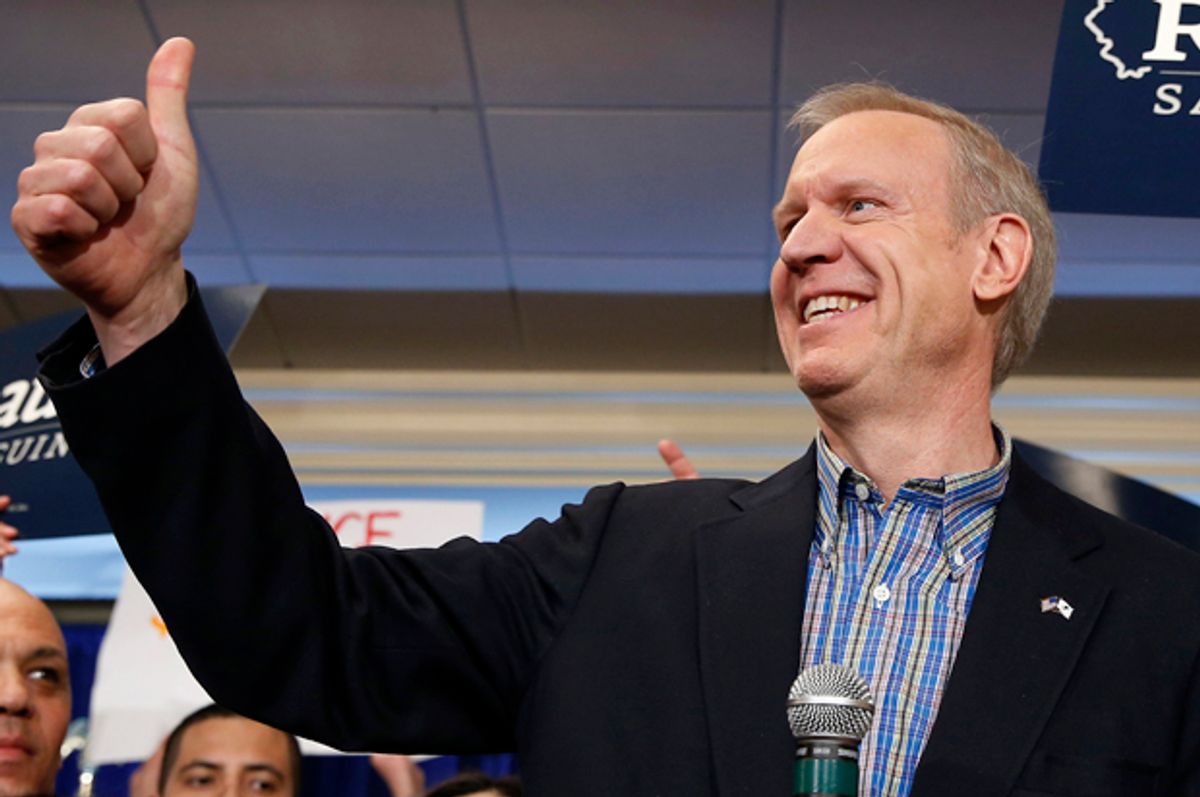Amid depressed turnout and pent-up frustration with the Springfield status quo, Illinois voters last November ousted Democratic Gov. Pat Quinn, awarding billionaire venture capitalist Bruce Rauner a five-point victory. The five weeks since Rauner took office as Illinois' first Republican governor in a dozen years have offered a vivid illustration of the truism that elections have consequences -- consequences that will be paid disproportionately by the state's poor, working class, and middle-income citizens.
Rauner fired the opening salvo in his war on workers earlier this month, issuing an executive order that allows public employees to opt out of paying fees to unions that collectively bargain on their behalf. Under current state law, nonmembers who benefit from union contracts -- about 14 percent of unionized state employees -- must pay "fair share" fees to help fund collective bargaining and contract negotiations; those fees are lower than the dues paid by full members. Despite a 1977 Supreme Court ruling upholding the constitutionality of fair share fees, Rauner argues that they're unconstitutional, forcing workers to support political speech with which they disagree. The governor makes this assertion even though, in accordance with that same Court ruling, public unions don't use fair share fees to fund political activities. Cognizant that he's on shaky legal ground, Rauner has retained the white-shoe law firm Winston & Strawn to defend his executive order in court.
While the governor recognizes that the political dynamics don't favor a statewide right-to-work law, he has expanded his fight against unions to include a proposal for "right-to-work zones," in which workers would be allowed to opt out of paying union fees even if they benefitted from union-negotiated contracts. The inevitable consequence -- and deliberate aim -- would be a further erosion of unions' bargaining power.
Another set of flaming volleys flew in the direction of the state's working people on Wednesday, as Rauner delivered his first budget address before lawmakers in Springfield. Rauner called for an 11.5 percent cut in the state's budget for the year beginning July 1, urging lawmakers to bring the budget down to $31.5 billion from its current level of $35.6 billion. Hardest hit would be health care for poor people, higher education, and mass transit.
The Chicago Tribune reports that the governor's budget would slash Medicaid spending by $1.5 billion, cut higher education by $387 million, and reduce revenue-sharing with cities and towns by $600 million. Rauner also targets transportation, calling for an end to a state subsidy that helps fund reduced fares for the poor and disabled.
Moreover, Rauner would cut pensions for current state workers, moving them to the lower-benefit pension plan for recent hires, despite a state constitutional injunction against the diminishment of pension benefits. The governor's budget would exempt police officers and firefighters from the change.
State Sen. Heather Steans, a Chicago Democrat, told the Tribune that she was particularly worried by the governor's proposed cuts in mental health care not covered by Medicaid.
“Cutting mental health at this point in time just does not seem like it’s viable or certainly not an intelligent long-term savings plan,” she told the paper, citing fears that the cuts would lead more people to end up in jails and prisons. “You end up having more expensive costs in other higher-cost settings. I think that’s very sort of short-sighted.”
Even neoliberal Chicago mayor Rahm Emanuel -- a close personal friend of Rauner's -- raised significant concerns about the budget. Emanuel told a Tribune reporter that Rauner should emphasize "closing corporate tax loopholes" over spending cuts, and the mayor decried the idea that one can "balance the state's budget on the backs of the children of the city of Chicago."
For his part, Rauner insists war is peace, freedom is slavery, ignorance is strength, and his budget is a boon for "working families."
"Illinois government is currently designed to benefit those inside the system rather than those working families throughout our state," he told lawmakers. "We must institute major reforms, or whatever balanced budget we craft together this year will be undone to put the people’s interests first and the special interests last."
In Rauner's Illinois, the poor, the sick, students, and ordinary wage-earners constitute "the special interests." Putting people first, meanwhile, requires gutting social services and ending hard-fought worker protections. This, in all its cruel Orwellianism, is what Republican governance looks like.

Shares